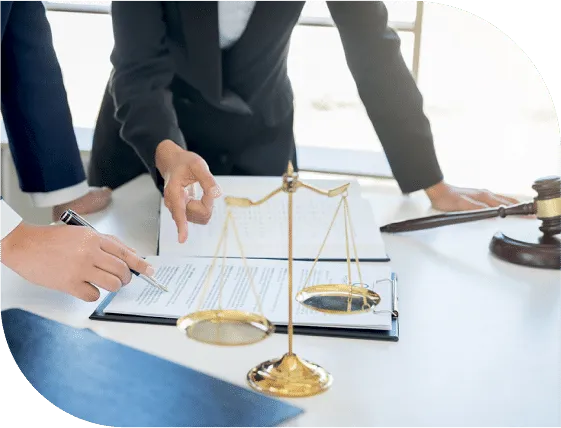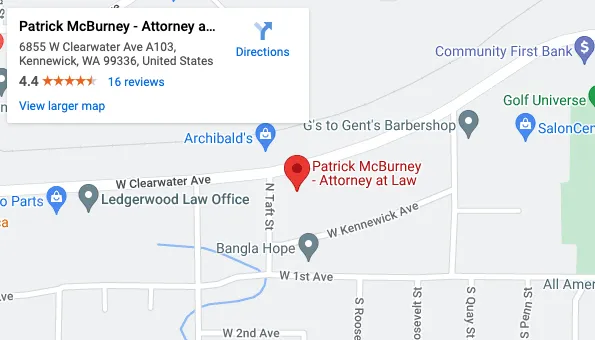Trusted Bankruptcy Attorneys in Washington
With Chapters 7 and 13, we lead by experience to give you a clean slate.
Trust our empathetic bankruptcy attorneys to get you debt-free and restore your family.
- Sued by creditors
- Facing impending foreclosure
- Scared of car repossession
- Fearing a knock on your door could be a creditor
- Avoiding your mailbox
- Emptied up your savings
- Maxed out credit cards
- Falling behind on payments
Your best bet may be to file for bankruptcy! Bankruptcy protection is a legal safeguard to help people recover from their terrible financial situation. You may be feeling confused and overwhelmed by your debts. Our Washington bankruptcy attorney at McBurney Law Office can lay out your possible options. Call us today for sound legal advice on your bankruptcy case!
Why do I need a Bankruptcy Attorney in Washington State?
Filing for bankruptcy can be the solution to your problems! If you do it right, bankruptcy can allow you to escape your debt and get a fresh start.
The key, however, is getting it right. If you overlook something in your filing, it may cause your bankruptcy petition to be denied. This is why you need the services of our experienced bankruptcy attorney, Patrick D McBurney.
He gives a fresh start with their finances by guiding them through bankruptcy and representing them in court. Working decades of family and criminal law cases, Patrick McBurney has an edge when it comes to understanding everything involved in a financial crisis.

- Convenient location: We have two locations in Kennewick and Spokane to serve our Washington neighbors better. We can help people as far as Adams County (Othello, Moses Lake, Ritzville), and Yakima County (Yakima, Sunnyside, Grandview, Mabton, Toppenish, Selah)
- An empathetic face in a time of need: As a local firm, we foster sincere attorney-client relationships with the people we serve. We take the time to actually listen to your financial concerns so we can find the best solution for you.
- Personalized legal services: We won’t leave you to work on the bankruptcy forms yourself. We will guide you through each step, from consultation to discharge. In fact, you can personally speak to Patrick McBurney in a one-on-one legal consultation!
- Extensive experience: Our Washington law firm has over 26 years of experience helping clients, with an emphasis on bankruptcy law.
There’s no one better to help you through bankruptcy than Patrick McBurney. He is the best lawyer around to help you when filing bankruptcy. If you’re ready to get out of debt, call our Washington law office today to get started!
What is Bankruptcy?
- Stop creditors from harassing you. Once you file for bankruptcy, the court orders an automatic stay. This prevents creditors and their lawyers from pursuing collection actions, such as calling you or filing a lawsuit.
- Wipe out your unsecured debt. Secured debts are those backed by collateral. If it doesn’t have one, it’s unsecured. Bankruptcy is excellent for eliminating your obligation to pay unsecured debt.
- Stop foreclosure, repossession, or eviction. If these actions are still pending, then an automatic stay can stop them, at least temporarily. Depending on the bankruptcy chapter you file, you may be able to stop them entirely.

What is a Bankruptcy Discharge?
- Personal loans from employers, friends, or family
- Overdue utility bills
- Most car accident claims
- Government program overpayments
- Collection agency accounts
- Credit card debt
- Medical bills
- Business debt
- Money owed from overdue rent and lease agreements
- Most attorney fees
- Old tax penalties and unpaid taxes
Bankruptcy can eliminate a lot of your debt. Ask an experienced Washington bankruptcy attorney to thoroughly review your case so you can discharge as much debt as possible.
Will All My Debts Receive a Discharge?
- Certain taxes
- Student loans
- Fines and penalties owed to government agencies
- Child support
- Spousal support
- Personal injury compensation from DUI
- Court penalties and fines
This is not an exhaustive list. Both your dischargeable and nondischargeable debt can vary based on your case. To ensure you don’t get anything wrong, consult a knowledgeable Washington bankruptcy lawyer today!
Our Bankruptcy Options
Chapter 7
Get debt relief faster with a legal solution that discharges all your payments. We guide you along the Chapter 7 bankruptcy process. Then, you can protect what matters most, including your home and vehicle.
A Chapter 7 bankruptcy involves a trustee who takes your assets and sells them to pay off your debt. There are bankruptcy exemptions, which means not all your property can be sold for this purpose.


Chapter 13
Our Chapter 13 bankruptcy attorneys restore your creditworthiness by erasing unsecured debt. Then, we help you with financial counseling and a repayment plan to get you on your feet again.
A Chapter 13 bankruptcy involves organizing your debts into a single repayment plan. Once you pay it off, you may be eligible for a bankruptcy discharge.
Financial Freedom for Washington
Visit our convenient office in local Kennewick for all your bankruptcy case needs. You can get a fresh start and discharge all your debts if you’re overwhelmed by creditors and collectors.
Our Washington bankruptcy lawyers serve the heart of Spokane via Zoom for your convenience. If you are drowning in debt and need a way out, we understand and are here to help.
Call our Washington Bankruptcy Attorney Now!
You don’t have to be stuck struggling with your debt. Bankruptcy offers you a way to escape your obligations and get a fresh start. Patrick D. McBurney, Jr., Attorney at Law, can help you through the bankruptcy proceedings to make sure it goes without a hitch.
The McBurney Law Office is owned and run by Patrick McBurney. For more than 25 years, he has practiced law in the state of Washington. He is admitted to practice in North Dakota, Idaho, and Washington. Mr. McBurney is a member of the National Association of Chapter Thirteen Trustee’s organization (NACTT), the National Association of Consumer Bankruptcy Attorneys, and the Federal Bar Association for the Western and Eastern Districts of Washington (NACBA). In bankruptcy disputes, he has defended thousands of clients. His diverse practice encompasses family law, criminal defense, and public defense.
Don’t wait. Get out of debt by calling our Washington law office today!


